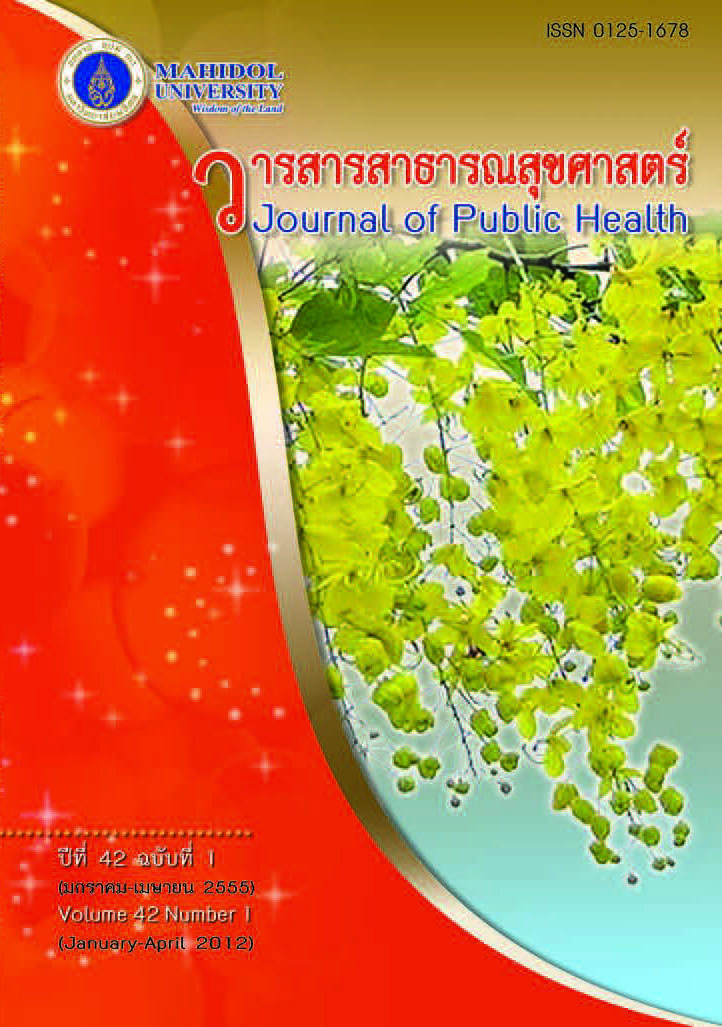ผลของการประเมินหลักสูตรการพัฒนาความฉลาด 4 ด้านของวัยรุ่นไทย
Keywords:
การประเมิน, ความฉลาด, โปรแกรม, วัยรุ่น, Evaluation, Intelligence, Program, AdolescentsAbstract
บทคัดย่อ
การศึกษาแบบ Pre test - post test design มีวัตถุประสงค์เพื่อประเมินหลักสูตรการพัฒนา ความฉลาด 4 ด้านคือฉลาดคิด ฉลาดทำ ฉลาดใจ และฉลาดสัมพันธ์ของวัยรุ่นซึ่งพัฒนาโดยสถาบัน สุขภาพจิตเด็กและวัยร่นุราชนครินทร์ กรมสุขภาพจิต มีวัยรุ่นและผู้ปกครองที่สมัครเข้าโครงการจำนวน 241 คน จาก 5 จังหวัดที่เป็นตัวแทนของแต่ละภาค ได้แก่ กรุงเทพมหานคร ราชบุรี อุตรดิตถ์ สุรินทร์ และ นครศรีธรรมราช โดยใช้แบบสอบถามสำหรับ ข้อมูลเชิงปริมาณ ส่วนสัมภาษณ์เชิงลึกใช้การสุ่ม แบบเฉพาะเจาะจงตัวอย่างวัยรุ่นและผู้ปกครอง จำนวน 25 คู่ ผลการศึกษาพบว่า วัยรุ่นที่เข้าร่วม โครงการเป็นหญิงมากกว่าชาย (หญิงร้อยละ 66.4) อายุเฉลี่ย 15.8 ปี คะแนนเฉลี่ยความคิดเห็นและ การปฏิบัติตนของวัยรุ่นเกี่ยวกับความฉลาดทั้ง 4 ด้าน ก่อนและหลังเสร็จสิ้นโครงการ 1 สัปดาห์ และ 3 เดือน (ตามลำดับ) เพิ่มขึ้นอย่างมีนัยสำคัญทางสถิติ (p < 0.05) ส่วนผู้ปกครองที่ประเมินวัยรุ่น เป็นหญิง ร้อยละ 69.3 อายุเฉลี่ย 43.9 ปี พบว่า มีคะแนน เฉลี่ยเพิ่มขึ้นทั้ง 2 ด้าน คือ ความคิดเห็น และ การปฏิบัติ (p < 0.05) ผลการสัมภาษณ์เชิงลึก พบว่า วัยรุ่นเห็นว่ามีประโยชน์ แตกต่างจากโครงการ ค่ายอื่นเพราะได้รับความรู้ ประสบการณ์ และความ สนุกสนาน กิจกรรมเหมาะสมกับวัยรุ่นได้พัฒนาและ เปลี่ยนแปลงตนเองไปในทางที่ดีขึ้น โดยเฉพาะเรื่อง ความสัมพันธ์ การคิดและทำงานร่วมกับผู้อื่นคุณธรรม และจริยธรรม ซึ่งล้วนแต่นำมาใช้ในชีวิตประจำวัน ได้เป็นอย่างดี หลักสูตรนี้สามารถพัฒนาความฉลาด ทั้ง 4 ด้าน ให้วัยรุ่นไทยได้ และมีความคงทนของ การปฏิบัติตนอย่างน้อยเป็นเวลา 3 เดือนหลังเข้ารับ การอบรม
คำสำคัญ: การประเมิน; ความฉลาด; โปรแกรม; วัยรุ่น
ABSTRACT
The study was a pre test - post test design to evaluate the program designed to improve the four aspects of intelligence including logical, problem-solving, emotional and interpersonal intelligence among Thai adolescents. The program - developed by the Child and Adolescent Mental Health Rajanagarindra Institute, Department of Mental Health - was conducted in five different regions in Thailand including Central (Bangkok), Western (Ratchaburi), Northern (Uttaradit), Northeastern (Surin) and Southern (Nakhon Sithammarat) regions. A total of 241 adolescents and their guardians were included in the evaluation. The questionnaire was used for the quantitative data, while five pairs of participants from each province were selectively interviewed during the qualitative study phase. Results showed that 241 teenagers (female 66.4%, mean age = 15.8 years old) reported an improvement of mean score in attitude and behavior at three months and one week after completing the program (p < 0.05). Moreover, 241 guardians (female 69.3%, mean age = 43.9 years old) reported the same improvement (p < 0.05). In-depth interviews revealed that the participating adolescents obtained valuable knowledge and experience while they enjoyed the program as well. They demonstrated the improvement in their behaviors, emotional state, problem-solving skills, interpersonal relationship and more importantly moral standards. The conclusion can thus be formed that this activity-based program can improve the four aspects of intelligence among Thai adolescents and its effect may last up to three months after completion of the program.
Key words: Evaluation; Intelligence; Program; Adolescents
Downloads
Issue
Section
License
Creative Commons License CC-BY-ND


